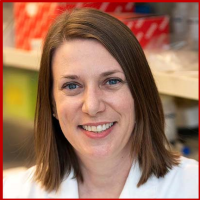
Jennifer Woyach, MD Hematologist-Oncologist The Ohio State University Comprehensive Cancer Center – The James

Deepa Sampath, PhD Associate Professor The University of Texas MD Anderson Cancer Center
CLL researchers, Dr. Jennifer Woyach and Dr. Deep Sampath, discuss how they work together and their currently funded CLL Global Research Foundation project.
Transcript
Dr. Jennifer Woyach:
My name is Jennifer Woyach. I’m a professor at The Ohio State University, and I was introduced to the CLL Global Research Foundation through my longtime collaborator, Dr. Deepa Sampath, who works here at MD Anderson Cancer Center. And we’ve been fortunate to be able to propose and get funded a research project through this mechanism.
Dr. Deepa Sampath:
I’m Deepa Sampath. I was a trainee at MD Anderson before I went to Ohio State University.
Dr. Keating gave me my first opportunity to get funded with the CLL Global, and he has been an amazing force in my research career. He also got me interested in TP53 CLL. When I went to Ohio State, Jennifer and I started working on so many things together, that now that I’m back, we continue to work together.
The project we’ve currently been funded on is a trial that was identified – the target of it was identified by Dr. Woyach. It’s PKC beta, and the molecule we use to target it is MS553. So, what we’ve done is the pre-clinical work. And then now, she’s run a clinical trial, which we also opened at MD Anderson, and we’re together doing the correlator work.
Dr. Jennifer Woyach:
So, our CLL Global project started with work that we had been doing looking at mutant TP53 in CLL and identifying both PKC beta and Bcl-XL as potential kind of intermediate targets that might be used to indirectly target mutant P53 in CLL. And so, in addition to the work on PKC beta, we’ve also been working on pre-clinical data and subsequently moving to a clinical trial with a BCL-2/Bcl-XL inhibitor in CLL, which is also working very promising.
Funding from CLL Global is really instrumental in moving research forward in CLL for a couple of different reasons, 1). is it’s obviously specifically focused on work in CLL. And I think, right now, there’s a common misperception that a lot of CLL is fixed. And I think that has decreased funding available at the national level for this disease. And so, everybody who works in CLL knows that there are patients who still need novel therapies for CLL. There is still much about the biology of CLL in Richter’s transformation that is yet to be uncovered. And having specific funding through organizations like CLL Global really is able to move that research forward. In addition, many times when we’re looking at funding through the National Cancer Institute, for example, many times projects get funded that are almost completed. So, it needs to be a sure bet in order to get funding through those types of mechanisms. And CLL Global really allows them early work that could potentially be transformative to get off the ground.
Dr. Deepa Sampath:
I think CLL Global is unique in the sense that they’re willing to take a chance on a number of researchers, get the early ideas out, so they can develop it into a full-fledged research program.

